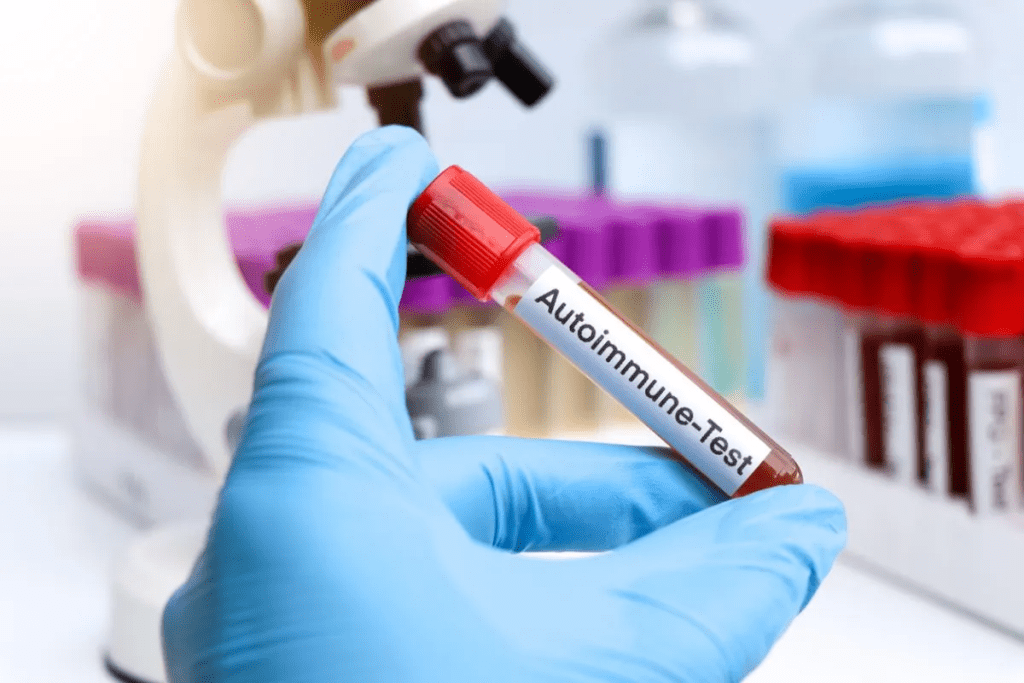Last Updated on October 21, 2025 by mcelik

Recent studies have shown that autoimmune blood disorders are a big concern, affecting patients worldwide and requiring careful management. Hematologists are key in diagnosing and treating these complex conditions.
Our experienced hematology teams provide specialized care for patients dealing with autoimmune blood disorders. Our experts are committed to top-notch healthcare, using advanced treatments and research. We know how important a personalized approach is in treating immune system disorders and helping patients improve their quality of life.
Autoimmune diseases are when the immune system attacks the body’s own tissues. This can cause many health problems, including issues with the blood. It’s a complex issue that affects different parts of the body.
Research shows that autoimmune diseases happen when the immune system attacks healthy cells. This can lead to a range of health issues, from mild to severe. Knowing how autoimmunity starts is key to treating it well.
Autoimmunity develops from many factors. Genetics, environment, and hormones all play a part. For example, some genes make you more likely to get an autoimmune disease. Environmental factors, like infections, can also trigger it.
“The immune system’s role is to protect the body against harmful invaders, but in autoimmune diseases, this system malfunctions and targets the body’s own cells and tissues.”
National Institutes of Health
Understanding autoimmunity is vital for finding good treatments. Studies show that autoimmune diseases are more common in women. This suggests hormones play a role.
Autoimmune diseases affect many parts of the body. Common ones include rheumatoid arthritis, lupus, and type 1 diabetes. Blood disorders like autoimmune hemolytic anemia and immune thrombocytopenia are also autoimmune conditions.
| Autoimmune Disease | Affected Body System | Key Characteristics |
| Rheumatoid Arthritis | Joints | Inflammation, pain, and stiffness in the joints |
| Lupus | Multiple systems | Varied symptoms including skin rashes, joint pain, and kidney issues |
| Type 1 Diabetes | Pancreas | Destruction of insulin-producing beta cells, leading to high blood sugar |
| Autoimmune Hemolytic Anemia | Blood | Destruction of red blood cells, leading to anemia |
Each autoimmune disease needs a specific treatment plan. Knowing the disease well helps doctors give better care.
Autoimmune blood disorders happen when the immune system attacks the body’s own blood cells. This can affect different parts of the blood. If not treated, these conditions can greatly reduce a person’s quality of life.
The immune system is meant to fight off harmful invaders. But in autoimmune blood disorders, it mistakenly attacks the body’s own blood cells. This can damage red blood cells, platelets, or white blood cells, depending on the condition.
Research shows that if left untreated, autoimmune blood disorders can cause serious problems. For example, the loss of red blood cells can lead to anemia and fatigue.
There are many types of autoimmune blood disorders, each affecting different blood components. Some common ones include:
It’s important to understand these conditions to develop effective treatments. By knowing how the immune system plays a role, doctors can offer therapies to help manage symptoms and improve outcomes.

Hematologists play a vital role in managing autoimmune diseases. They are medical experts trained to handle blood disorders, including autoimmune conditions. This is important for treating these complex conditions.
A hematologist is a doctor who focuses on blood and blood-forming organs. They treat conditions like anemia, bleeding disorders, and blood cancers. They also handle autoimmune diseases that affect blood cells.
Hematologists provide specialized care for patients with blood disorders. Their deep knowledge of blood cell biology helps them create treatment plans for each patient.
Hematologists get extensive training to manage blood disorders. They complete medical school, then do residency in internal medicine or pediatrics. They also have fellowship training in hematology.
This specialized training keeps hematologists up-to-date with new treatments and diagnostic methods for autoimmune blood disorders.
If you have symptoms like unexplained fatigue, frequent infections, or easy bruising, see a hematologist. Your primary care doctor can refer you if they think it’s a blood-related issue.
Seeing a hematologist is a good idea if you have an autoimmune condition affecting your blood cells. They offer targeted care to manage your condition well.

In the world of blood cells, autoimmune disorders start a fight. This fight is between the body’s defense and its own cells. It mainly affects white blood cells and red blood cells.
White blood cells, or leukocytes, are key to our immune system. They fight infections and invaders. Red blood cells, or erythrocytes, carry oxygen to our body’s tissues and organs.
White blood cells roam the body, finding and fighting off pathogens. Red blood cells, with their hemoglobin, make sure tissues get the oxygen they need.
In autoimmune blood disorders, the immune system sees the body’s own blood cells as enemies. It attacks them. This can destroy red blood cells or harm the production and destruction of white blood cells and platelets.
Autoantibodies and immune complexes mark the body’s cells for destruction. This can happen due to genetics, environment, or other autoimmune diseases.
The effects of autoimmune blood cell destruction can be serious. For example, autoimmune hemolytic anemia (AIHA) destroys red blood cells. This leads to anemia, fatigue, and shortness of breath. Autoimmune neutropenia destroys neutrophils, a type of white blood cell, raising the risk of infections.
| Condition | Cells Affected | Clinical Consequences |
| Autoimmune Hemolytic Anemia (AIHA) | Red Blood Cells | Anemia, Fatigue, Shortness of Breath |
| Autoimmune Neutropenia | Neutrophils (White Blood Cells) | Increased Risk of Infections |
| Immune Thrombocytopenia (ITP) | Platelets | Bleeding, Bruising |
Knowing these details is key to diagnosing and treating autoimmune blood disorders.
Autoimmune hemolytic anemia is a complex condition. The immune system mistakenly attacks and destroys the body’s own red blood cells. This shows how the immune system can sometimes turn against its host.
We will explore the different facets of autoimmune hemolytic anemia. This includes its types, symptoms, complications, and diagnostic approaches. Understanding this condition is key for effective management and treatment.
Autoimmune hemolytic anemia can be classified into two main types. These are based on the temperature at which the antibodies react with red blood cells: warm antibody hemolytic anemia and cold antibody hemolytic anemia.
The destruction of red blood cells in autoimmune hemolytic anemia can lead to various symptoms and complications. These include:
Diagnosing autoimmune hemolytic anemia involves several tests. These tests confirm the presence of the condition and identify the underlying cause. The tests include:
Understanding the diagnostic approaches is essential. It helps healthcare providers develop an effective treatment plan for patients with autoimmune hemolytic anemia.
It’s important to know about immune thrombocytopenia and other platelet disorders. These conditions happen when the immune system attacks platelets by mistake. This can cause serious health problems.
In immune thrombocytopenia, the immune system makes antibodies against platelets. This marks them for destruction. As a result, there are fewer platelets, making it hard for blood to clot and raising the risk of bleeding.
“The pathophysiology of immune thrombocytopenia involves a complex interplay between immune cells and platelets.” This complex process can cause a range of symptoms, from mild bruising to severe bleeding.
People with immune thrombocytopenia often bruise and bleed easily because of low platelet counts. Symptoms include:
These symptoms can really affect a person’s life, so they need quick and effective treatment.
Treatment for immune thrombocytopenia usually involves medicines that stop the immune system from attacking platelets or help make more platelets. Common treatments are:
A leading hematologist notes,
“The goal of treatment is not only to increase platelet count but also to improve the patient’s overall quality of life.”
Treatment plans are made to fit each patient’s needs and how they respond to treatment.
Diagnosing autoimmune blood disorders needs a detailed approach with many tests. These disorders happen when the immune system attacks the body’s blood cells by mistake. They can be hard to spot because their symptoms are not clear and their causes are complex.
We use different tools to find these disorders. First, we take a detailed medical history and do a physical check-up. Then, we do specific tests.
A Complete Blood Count (CBC) is often the first test for these disorders. It shows important details about blood, like red and white cells and platelets.
CBC Parameters:
| Parameter | Normal Range | Significance in Autoimmune Disorders |
| Hemoglobin (Hb) | 13.5-17.5 g/dL (men), 12-16 g/dL (women) | Low levels may indicate anemia due to autoimmune hemolysis |
| White Blood Cell Count (WBC) | 4,500-11,000 cells/μL | Abnormal counts can indicate immune system activation or suppression |
| Platelet Count | 150,000-450,000 platelets/μL | Low platelet count (thrombocytopenia) can be seen in autoimmune platelet destruction |
After the CBC, we do more tests to confirm the diagnosis. These tests look for specific autoantibodies or immune system problems.
Common immunological tests include:
In some cases, we need to check the bone marrow. This is to diagnose certain disorders or to rule out other bone marrow problems.
Bone Marrow Examination:
By combining these test results, we can accurately diagnose autoimmune blood disorders. Then, we can plan the right treatment.
Autoimmune blood disorders need a team effort. Hematologists and other specialists work together. This team approach is key to managing these complex conditions.
Rheumatologists and immunologists are vital in treating autoimmune blood disorders. Rheumatologists focus on musculoskeletal issues. Immunologists understand immune system problems.
We team up with these experts for a full care plan. For example, a patient with autoimmune hemolytic anemia gets help from a hematologist and a rheumatologist or immunologist.
Managing autoimmune blood disorders often requires a team. A patient with a complex condition might see a hematologist, a rheumatologist, and an immunologist. Each specialist brings their expertise to the table.
We believe in the power of teamwork. Specialists share knowledge, plan treatments together, and cover all aspects of a patient’s condition.
You are the heart of your care team. We help coordinate your care with specialists. This ensures everyone is on the same page.
Open communication is key. It helps us provide complete care for autoimmune blood disorders.
Managing autoimmune blood disorders needs a custom treatment plan. Treatments include corticosteroids, immunosuppressive drugs, and targeted therapies, as shown in the Blood Advances Journal.
Corticosteroids are often the first choice for treating these disorders. They help by reducing inflammation and suppressing the immune system. Prednisone is a common corticosteroid used.
But, long-term use can cause problems like osteoporosis and infections. Doctors may adjust the dosage or switch treatments to avoid these issues. For some, intravenous immunoglobulin (IVIG) is used to control the immune system.
When corticosteroids don’t work or are needed long-term, immunosuppressive medications are used. These drugs reduce the immune system’s attack on blood cells.
It’s important for a hematologist to closely monitor these treatments to manage risks and benefits.
Rituximab, a monoclonal antibody, targets immune cells. It helps by reducing B-cells, which can lower the autoimmune response.
“The introduction of rituximab and other targeted therapies has revolutionized the treatment landscape for autoimmune blood disorders, providing new options for those who didn’t respond to traditional treatments.”
Targeted therapies like rituximab offer precise treatments with fewer side effects than broad immunosuppressants.
In summary, treating autoimmune blood disorders is complex and needs a tailored approach. Understanding the available treatments helps patients and doctors create effective plans.
Diagnosing and treating autoimmune blood disorders in kids is complex. These disorders require special care and treatment. We must think about the unique needs of children when treating these conditions.
Children with autoimmune blood disorders face unique challenges. Their immune systems are developing, and treatments can have long-term effects. We must tailor our care to meet the needs of each child, considering their age, health, and the disorder’s severity.
The way a child’s immune system develops is key. In kids, the immune system is not fully grown. This can change how autoimmune blood disorders show up and progress.
Common autoimmune blood disorders in kids include AIHA, ITP, and Evans syndrome. These conditions can greatly affect a child’s life. They need quick and effective treatment.
Treatment for kids with autoimmune blood disorders varies. It depends on the condition, its severity, and the child’s health. We often start with corticosteroids to reduce the immune system’s attack on blood cells.
Some kids may need immunosuppressive medications to control the immune response. In some cases, rituximab and other targeted therapies work well. Choosing the right treatment is very individualized. We work closely with families to adjust the treatment plan as needed.
Parents and caregivers must work closely with a pediatric hematologist. With the right treatment, many kids with autoimmune blood disorders can live active and healthy lives.
Rare autoimmune blood conditions are tough to diagnose and treat. They need a detailed and specialized plan to manage well. We’ll look at some rare conditions, their signs, how to diagnose them, and treatment options.
Evans syndrome is a rare condition. It combines autoimmune hemolytic anemia and immune thrombocytopenia. Sometimes, it also includes autoimmune neutropenia, leading to autoimmune pancytopenia. Diagnosing Evans syndrome is hard because it looks like other autoimmune blood disorders.
Pure red cell aplasia is rare. It stops the body from making red blood cells. It can be caused by things like thymoma, viral infections, or autoimmune disorders. Doctors use bone marrow tests to check red cell production.
Cold agglutinin disease is a rare autoimmune hemolytic anemia. It’s caused by antibodies that attack red blood cells in cold temperatures. Symptoms get worse in cold, and treatment includes avoiding cold and using immunosuppressive therapies.
Living with autoimmune blood disorders can be tough. But, with the right support and management, patients can live fulfilling lives. These disorders need ongoing care to manage symptoms and prevent problems.
Fatigue is a big issue for those with autoimmune blood disorders. Effective management includes medical treatment, lifestyle changes, and sometimes alternative therapies.
Other symptoms like bruising, bleeding, or anemia also need attention. Regular check-ups and treatment plan adjustments are key.
People with autoimmune blood disorders often can’t donate blood. This is because of the risk of passing on autoimmune antibodies or other issues.
It’s vital for patients to know the specific rules for their condition. Consulting with a hematologist can help figure out if blood donation is safe for them.
Support is key in managing autoimmune blood disorders. Patients can find help from:
Organizations like the National Organization for Rare Disorders (NORD) offer valuable resources and support for patients with rare autoimmune blood disorders.
It’s important to understand autoimmune blood disorders to manage them well. Hematologists are key in diagnosing and treating these complex conditions. We’ve looked at treatments like corticosteroids, immunosuppressive drugs, and targeted therapies like rituximab.
Patients with these disorders need a lot of support. This includes managing fatigue, knowing about blood donation rules, and joining support groups.
By teaming up with a hematologist and using available support, patients can face the challenges of autoimmune blood disorders. Good treatment and care can greatly improve their quality of life.
Autoimmune blood disorders happen when the immune system attacks the body’s own blood cells. This leads to health problems.
These disorders can cause symptoms like anemia, bruising, and bleeding. The specific symptoms depend on the condition and affected blood cells.
Hematologists are experts in blood disorders, including autoimmune ones. They provide care and management for these conditions.
There are warm antibody and cold antibody types of autoimmune hemolytic anemia. Each has its own characteristics and treatment options.
Autoimmunity can cause low platelet counts. This increases the risk of bruising and bleeding. Specific treatments are needed.
Diagnosis involves a complete blood count, immunological tests, and sometimes bone marrow evaluation. These help determine the condition.
Yes, children can get autoimmune blood disorders. They need special treatment and care tailored to their needs.
Rare conditions include Evans Syndrome and autoimmune pancytopenia. There are also pure red cell aplasia and cold agglutinin disease. Each has its own challenges in diagnosis and treatment.
Treatment options include corticosteroids, immunosuppressive drugs, rituximab, and targeted therapies. The choice depends on the condition and patient needs.
Yes, some autoimmune blood disorders may restrict blood donation. It’s important to talk to healthcare providers for guidance.
Patients can find support through patient organizations, counseling, and online communities. These resources help manage the condition and improve quality of life.
Managing symptoms involves medical treatment, lifestyle changes, and sometimes alternative therapies. These help alleviate fatigue and other symptoms.
Subscribe to our e-newsletter to stay informed about the latest innovations in the world of health and exclusive offers!